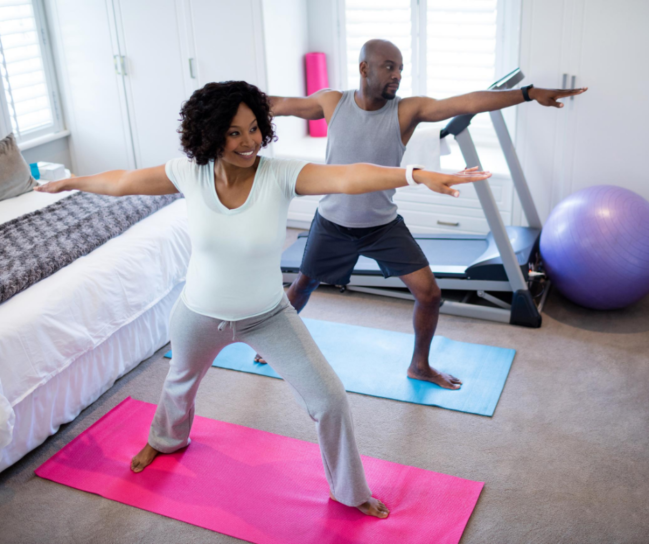These four tips will help you take control of stress management in a natural, whole health way so that you can truly start living the life that you desire.
You might not realize it, but stress affects every aspect of your health. It can cause brain function, digestive, endocrine, and cardiovascular complications, reduce immune system responses, alter hormones, and even lead to death.
Research shows that people who work in stressful environments are more likely to develop diseases and health disorders. Coupled with the uncertainty that many people currently feel with the COVID-19 pandemic, stress is something that cannot be ignored right now.
While it’s not always possible to control stressful events around you, you can control the way you respond to them.
Here are some of our best whole health tips for stress management.
1. Avoid stress eating.
Research shows that people eat differently when they are stressed. Specifically, they may crave hyperpalatable foods that are high in unhealthy fats and sugar.
This is due to the changes in your hypothalamic-pituitary-adrenal (HPA) axis, insulin sensitivity, glucose metabolism, and other appetite-related hormones that occur during stress.
High fat and high sugar foods trigger your body’s reward system, such as the release of dopamine. It might feel good to eat them at the time, but you will surely feel worse later as your blood sugar levels crash and your body responds to the inflammatory foods you just consumed.
Remember that eating will not make the stress go away and can possibly make you feel worse if you choose the wrong foods. You can stay one step ahead of the stress game by making sure you don’t keep unhealthy foods in the house.
Carry healthy snacks with you during the day, such as fruit and nuts, so that you’re not tempted to hit the drive through when you’re on the go. Lastly, avoid skipping meals throughout the day to prevent overindulging later on.
2. Try breathing exercises.
Breathing exercises are a good way to deal with stress on the spot, such as when you feel yourself reacting to a stressor. They can be done anywhere, such as in your car, at the office, and in bed.
According to one study, diaphragmatic breathing triggers body relaxation responses and benefits both mental and physical health by improving attention, controlling anxiety, and reducing cortisol levels.
The best way to learn how to control your breathing is to take a class. One study found that participants who took a six week long pranayama breathing exercise class significantly lowered their anxiety levels, improved cognition and parasympathetic activity, and boosted their general well being.
A 2018 study titled How Breath-Control Can Change Your Life found that slow breathing promotes increased comfort, pleasantness, vigor, alertness, and relaxation. It also reduces the symptoms of anxiety, arousal, anger, confusion, and depression.
If you can’t find a pranayama or yoga class near you (or you don’t have time to take one), then you can practice slow breathing by following this quick tutorial:
- Find a quiet place to lie down or sit. It may also help to close your eyes.
- Start by taking a normal breath. Then take a deep breath by breathing in slowly through your nose.
- During this time, allow your lower belly and chest to rise as your lungs fill with air. Allow your belly to fully expand. Hold for several seconds.
- Breath out slowly through your mouth or your nose if it seems more comfortable.
- Repeat for up to 20 minutes a day while focusing on a comforting image or word.
It might seem like this exercise is not doing much, but you are training your nervous system to control itself in response to stressful events.
3. Exercise.
Exercise is the best natural medicine for stress management you’ll ever find. It’s even better if you can get outdoors, but during stressful times, it’s better to do something rather than nothing.
In addition to helping clear your mind, research shows that exercise improves hormone responses and positively affects neurotransmitters, such as dopamine and serotonin, which are responsible for mood and behavior.
In fact, one study encourages you to take a break or time out from your stressor if possible and go exercise. This might be hard to do in the middle of a stressful work day.
However, as many people are working from home during the pandemic, it might be possible for a ten minute walk break a few times a day. You’ll come back better prepared to handle your day.
One study even found that exercise can help reduce future stress. Researchers from the University of Maryland School of Public Health studied the effects of how moderate intensity cycling or a period of rest affected college students.
Results concluded that exercise helps buffer the effects of emotional exposures and better prepared the students to maintain reduced anxiety levels in the future when confronted with emotional events.
Another study indicated that exercise positively affects heart rate, blood pressure, cortisol, and self-reported mood to protect against the negative emotional state of stress.
4. Go outside or visit green spaces.
Nature is truly healing. Even if you can’t exercise outside, research shows that being outdoors in a natural environment and visiting green spaces can reduce psychological stress.
This is especially important as many of us (and our kids) are homeschooling or working from home. Taking a break several times a day and sitting outside can help.
You can take it one step further and practice grounding, which is when your skin comes in contact with the Earth. You can practice grounding by taking your shoes off and walking barefoot in the grass.
According to one study, grounding reduces inflammation, boosts the immune response, promotes wound healing, improves sleep, reduces pain, and prevents and treats chronic diseases and autoimmune conditions.
Grounding is said to work by transferring the Earth’s electrons to your body, which have a healing effect on your health.
Getting outside several times a day can help reduce inflammation. Take your laptop outside and work if you have to. Get your toes in the ground, plant a garden, sit underneath a tree and read, or just enjoy the fresh air.
Bonus tip: practicing slow breathing outdoors is extremely relaxing!
Here are some more stress management related articles from Solaris Whole Health that might interest you:









